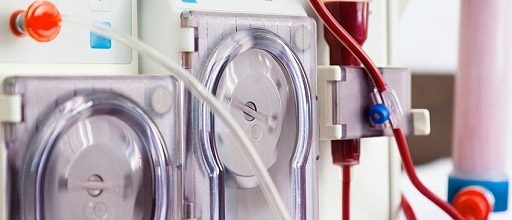
Research findings confirm aggressive kidney treatments not justified
New research findings will have significant impact on the treatment of kidney failure patients in intensive care settings around the world. The largest study of its kind has shown that aggressive continuous renal-replacement therapy, a type of dialysis designed to treat severe kidney failure in acutely ill patients in intensive care units (ICUs), does not improve the chances of survival. The research conducted in Australia and New Zealand reveals that lower-intensity dialysis is just as effective.
Severe acute kidney injury requiring dialysis to replace kidney function affects around 5% of patients admitted to the ICU and results in death for about 50% of patients. Continuous renal-replacement treatment replaces lost kidney function for people with acute kidney failure. To date, the optimal intensity of therapy has been unclear, but due to this new large study, researchers have confirmed that there is no difference between higher and lower-intensity treatments.
"We assessed 1508 critically ill adults with acute kidney injury, 747 were randomly assigned a higher-intensity therapy, and 761 to lower-intensity therapy. There were no benefits seen among patients assigned to a higher-intensity program of dialysis. In countries where continuous renal-replacement therapy is now the preferred form of renal-replacement therapy in the ICU, our study has significant implications for clinical practice", said, Professor Alan Cass, The George Institute.
Researchers set out to see if the higher-intensity treatment (40ml per kilogram of body weight per hour) compared to a lower-intensity treatment (25ml per kilogram of body weight per hour) would reduce mortality within 90 days of presenting to intensive care settings. Patients presented to the ICU with acute kidney failure due to a range of causes including severe infection, complications after major surgery or illness, with cardiovascular disease or surgery being the common precipitating factor, and trauma.
"Notably, this study found no significant benefit of high-intensity treatment for acute kidney injury patients, and there was also no evidence of significant harm. Importantly, survivors from both groups had a very low rate of dependence of ongoing dialysis at 90 days, which is extremely positive. We intend on following these patients in the future to assess their ongoing quality of life to show the impact these treatments could have on resources and broader hospital management", said Professor Rinaldo Bellomo, Australian and New Zealand Intensive Care Society.
"The results of the this landmark study also confirm that the use of low-intensity renal replacement therapy is associated with substantial cost savings in critically ill patients without compromising survival or rate of recovery of kidney failure", Professor Bellomo added.
The RENAL (Randomised Evaluation of Normal versus Augmented Level) Replacement Therapy Study is a multicentre, randomised controlled trial and is a collaboration of the Australian and New Zealand Intensive Care Society Clinical Trials Group (ANZICS CTG) and The George Institute for International Health. The study was conducted in 35 intensive care units in Australia and New Zealand. This study was supported by grants from the National Health and Medical Research Council of Australia and the Health Research Council of New Zealand.


